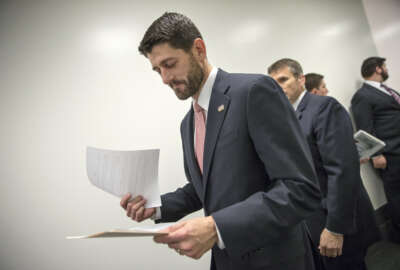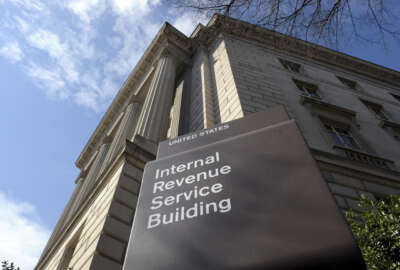
Pay raise, transit benefits parity gives feds optimism for 2016
The omnibus spending bill includes money for the FBI’s new headquarters, 10 years of credit monitoring services for OPM breach victims and much more for federal...
The 2016 spending bill holds more presents than lumps of coal for federal employees. The omnibus appropriations bill is the first one in some time that didn’t require federal employees to hold their collective breaths for possible pay and benefits changes.
For federal employees, it starts with the 1.3 percent pay raise President Barack Obama approved in August. It remains untouched. The spending bill was silent on the raise, which means as of Jan. 1, employees will see an increase.
Next comes what wasn’t in the bill. Congress didn’t attempt to or include any cuts or reductions on retirement or health benefits.
“We’ve gone from three years of a pay freeze to two years at 1 percent, thank god we are at least at 1 plus the locality, 1.3 percent or a little higher in some areas. They left our pensions alone. They left our health care alone,” said J. David Cox, the national president of the American Federation of Government Employees, during a press briefing with reporters on Dec. 16 in Washington. “The future does seem to look at little brighter than what we were seeing.”
Cox said he thinks the fact that the Republicans wanted to avoid another government shutdown and get something done before the election year, both of which played well for federal employees.
The news isn’t as good for political appointees. The omnibus bill continues the pay freeze for the Vice President and senior political appointees.
The other big area feds need to pay attention to is around transit benefits.
Congress agreed on a tax-extenders measure to establish permanent parity between the parking and transit benefits. Both benefits would be capped at $255 a month instead of the current transit benefit of $130 a month and parking benefit of $250 a month.
The Nation Treasury Employees Union says this parity would be retroactive to Jan. 1, 2015 at $250 a month, meaning some employees will see a significant chunk one-time payment of about $1,440 to make up for the last year.
Consult the Department of Transportation’s website for agency-specific guidelines on applying for mass transit benefits.
Sen. Ben Cardin (D-Md.) said the transit benefit is a huge win for tens of thousands of federal employees.
“That’s particularly important in the Washington area where so many of the workers use the transit systems. They’ve been disadvantaged because of the uncertainty as to whether they would get the parity with those who drive their car,” he said after a press briefing on Capitol Hill Wednesday. “Now that has been made permanent in the tax cut.”
Cardin said the overall attitude of the budget creation process was much different this year than previous efforts.
“You see rather a budget that shows some growth, shows some appreciation for the federal workforce, it’s not punitive. We’d like to see greater support. Those of who understand the important mission done by federal workers and sacrifices they’ve made over the years, we’d like to see a lot more in the budget,” he said. “The good news is we’ve turned the corner. If we can continue the momentum of giving more support to our federal workforce, both in the dollars they have to perform their mission as well as their own compensation, it will be good for our country.”
Credit monitoring extended
The appropriations bill also includes more money for several agencies.
The IRS, for one, would receive about $11.2 billion overall, including $290 million specifically targeted for taxpayer services to ensure that the agency responds to taxpayer questions in a timely manner, and to improve fraud detection and prevention and cybersecurity.
The Office of Personnel Management will be required to provide credit monitoring and identity theft protection services to individuals affected by the recent data breaches for 10 years instead of three years under the current deal, and $5 million in liability protection. This is a provision Sen. Barbara Mikulski (D-Md.) pushed for earlier this year
Congress approved the Homeland Security Department to receive a total of $819 million for cybersecurity operations in the National Programs and Protection Directorate (NPPD), an increase of $66 million over the 2015 enacted level. This funding will improve the Federal Network Security and Network Security Deployment programs such as EINSTEIN 3A and the continuous monitoring and diagnostics program.
Lawmakers also weighed in on the future of the FBI headquarters.
Mikulski, Cardin and others from the Maryland congressional delegation pushed for and got $390 million included in the spending bill package to help get the project started.
Mikulski said she believes Prince George’s County makes the most sense for the full consolidated headquarters of the FBI.
“You have to talk about are we going to have a partial consolidation or a full consolidation?” Mikulski asked. “It is the plan and the FBI Director [James] Comey has spoken out very clearly that he needs a modern FBI to do the mission for which the nation has charged it. That means one campus with all the people who are now working at the Hoover building and in these 30 leased spaces in the metropolitan area. We believe Maryland accommodates the full consolidation better than Virginia.”
Mikulski said two sites, one in Landover and the other in Greenbelt, Maryland, are on the short list of sites being considered by the FBI and the General Services Administration.
She said the FBI and GSA are expected to make a decision about where to put the new consolidated headquarters by November 2016.
Cardin said he’s not worried the new FBI headquarters will follow the same path as the DHS headquarters effort at St. Elizabeths in Washington, which has faced dwindling support in Congress, cost increases and delays.
He said the initial funding of $390 million plus GSA’s plan to sell the Hoover building in downtown D.C. will account for a big chunk of the money needed to build the FBI new headquarters.
TSA contract negotiations difficult
Now that the 2016 budget is all but settled, AFGE is looking to 2016 and beyond with more optimism for several reasons.
Cox said one reason is next year is an election year so the focus for lawmakers to get out of town and to get elected.
Second, he said, the two-year budget agreement brings stability to the agencies.
But he said AFGE still expects the fight for better pay and benefits for federal employees to remain a top priority for next year and beyond.
“At least we’ve gotten more people moving to additional locality page,” Cox said. “The blue collar pay is an issue we have been working very, very aggressively on. There shouldn’t be the split areas where you have the wage grade in one area and the General Schedule in another area. They should be combined areas. We will be working with that as well as pushing for better pay increases and better funding for the agencies. The only way I’m going to get that done, I understand, is by electing more people to Congress that believe government does a good job and are willing to spend money to have a good job that the government does.”
Cox said in some areas of the country, wage grade workers receive a lower percentage of locality pay than GS employees despite the fact they live in the same city or town or part of the country.
AFGE also highlighted its ongoing battle with the Transportation Security Administration to renew their contract.
Cox said TSA is more difficult to work with than all the other agencies combined. He said TSA management doesn’t want to give employees any rights such as having a grievance filing process or not allowing employees to file complaints with the Merit Systems Protection Board. Cox said even things such as negotiating parking benefits for employees is problematic.
Currently, TSA and AFGE are going to arbitration to settle about half of all issues remaining in the new contract.
Copyright © 2025 Federal News Network. All rights reserved. This website is not intended for users located within the European Economic Area.
Jason Miller is executive editor of Federal News Network and directs news coverage on the people, policy and programs of the federal government.
Follow @jmillerWFED




